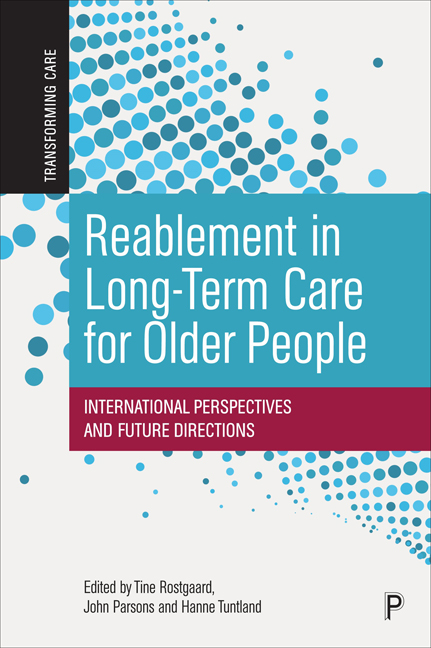3 - The ideas of reablement and their travel across time and space
Published online by Cambridge University Press: 18 January 2024
Summary
Introduction
Across a number of regions, the overall approach and design of reablement services were originally objectified under different names when they were enacted, and sometimes, institutionalised, in different geographical contexts. Nevertheless, there is a striking resemblance in the ideas of reablement and how they have materialised into reablement policies and practices, with common elements across regional locations and in specific countries (Metzelthin et al, 2020).
This chapter investigates the travelling of these ideas and their materialisation into reablement policies and practices, internationally as well as nationally. The main analysis explores whether and how the ideas behind reablement have travelled within and across three regional empirical cases and materialised into national policies and local practices. The chapter also investigates how this development has been supported sequentially by the policy agendas of ‘active and healthy ageing’, which have been part of international policy rhetoric for years, by such organisations as the European Union (EU), Organisation of Economic Co-operation and Development (OECD), and World Health Organization (WHO).
Two theoretical frameworks are applied: the travel of ideas across localities (Czarniawska and Joerges, 1996), and rhetorical frames related to policy change (Béland, 2009). The chapter is organised in three sections: after the theoretical framework and research methods are presented, the development of the transnational ideas of active and healthy ageing is outlined, and how these ideas may have materialised into objects and contributed to local actions and national institutions in three world regions are analysed; the chapter is rounded off with a discussion and a conclusion.
This study illustrates how ideas and local processes behind enabling and active approaches to ageing have not been unidirectional but rather a set of complex and composite processes. In many countries, there have been significant bottom-up processes as practical responses to ageing populations and financial pressures on public services; as we see it, however, influenced by the transnational ideas of active and healthy ageing.
Theoretical perspectives
To analyse these processes of travelling ideas, the chapter mainly draws on Barbara Czarniawska and her co-writers’ study of organisational changes across localities (Czarniawska and Joerges, 1996). The travelling ideas concept is understood as referring to ‘processes of translation’ or the sense that ‘to set something in a new place is to construct it anew’ (Latour, 1987, as cited in Czarniawska and Sevón, 2005: 8).
- Type
- Chapter
- Information
- Reablement in Long-term Care for Older PeopleInternational Perspectives and Future Directions, pp. 46 - 67Publisher: Bristol University PressPrint publication year: 2023



